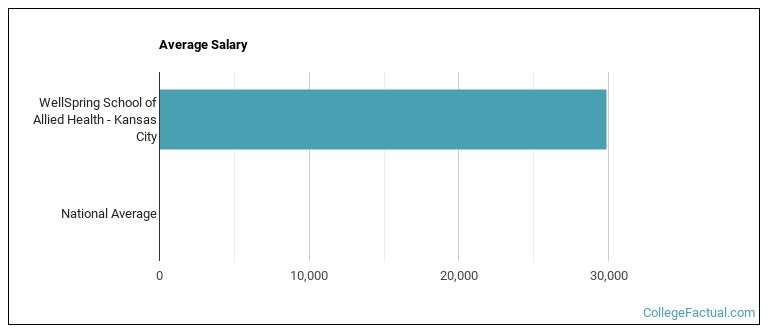 by our College Data Analytics Team
by our College Data Analytics TeamExplore the best ranked schools for the programs you are most interested in.
WellSpring - Kansas City was not ranked in College Factual's 2025 Best Overall Colleges report. This could be for a number of reasons, including lack of data.
See all of the rankings for WellSpring School of Allied Health - Kansas City.
WellSpring School of Allied Health - Kansas City has an open admissions policy, so you should not have much trouble being accepted by the school. Still, it is important to fill out the application completely and submit any requested materials, which may include proof that you have a high school diploma or the equivalent.
The student to faculty ratio is often used to estimate how much interaction there is between professors and their students at a college or university. At WellSpring School of Allied Health - Kansas City, this ratio is 14 to 1, which is on par with the national average of 15 to 1. That's not bad at all.
The freshmen retention rate tells us what percentage of first-year, full-time students choose to continue on to their sophomore year at a particular school. The rate at WellSpring School of Allied Health - Kansas City is 71%, which is about average when compared to the national rate of 68%.
During the 2017-2018 academic year, there were 173 full-time undergraduates at WellSpring - Kansas City.
| $0-30 K | $30K-48K | $48-75 | $75-110K | $110K + |
|---|---|---|---|---|
| $21,680 | $22,138 | $23,305 | $24,754 | $25,671 |
The net price is calculated by adding tuition, room, board and other costs and subtracting financial aid.Note that the net price is typically less than the published for a school. For more information on the sticker price of WellSpring - Kansas City, see our tuition and fees and room and board pages.
Almost 66% of college students who graduated with the class of 2018 took out student loans, but that percentage varies from school to school. At WellSpring - Kansas City, approximately 91% of students took out student loans averaging $10,508 a year. That adds up to $42,032 over four years for those students.
Get more details about paying for WellSpring School of Allied Health - Kansas City.

See which majors at WellSpring School of Allied Health - Kansas City make the most money.
Get more details about the location of WellSpring School of Allied Health - Kansas City.

Contact details for WellSpring - Kansas City are given below.
| Contact Details | |
|---|---|
| Address: | 9140 Ward Pkwy Ste 100, Kansas City, MO 64114-3313 |
| Phone: | 816-523-9140 |
| Website: | www.wellspring.edu/ |
| Most Popular Majors | Bachelor’s Degrees | Average Salary of Graduates |
|---|---|---|
| Somatic Bodywork & Therapeutic Services | 68 | NA |
| Allied Health & Medical Assisting Services | 29 | NA |
| Allied Health Professions | 20 | NA |
Footnotes
*The racial-ethnic minorities count is calculated by taking the total number of students and subtracting white students, international students, and students whose race/ethnicity was unknown. This number is then divided by the total number of students at the school to obtain the racial-ethnic minorities percentage.
References
More about our data sources and methodologies.